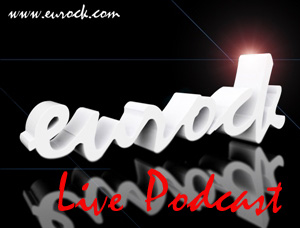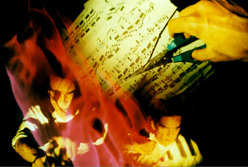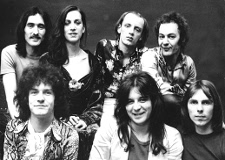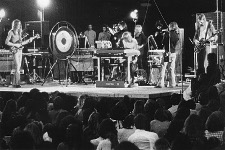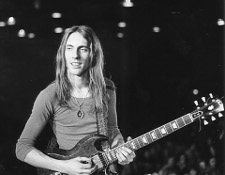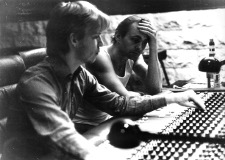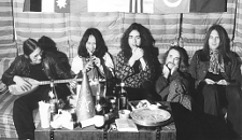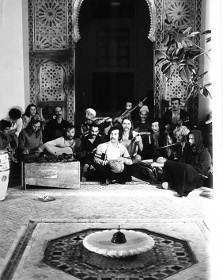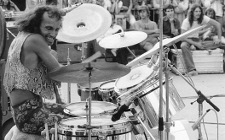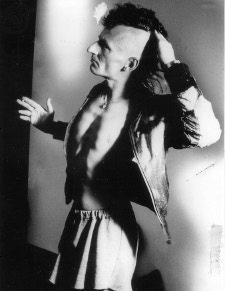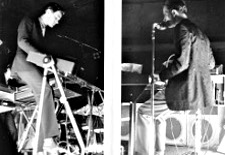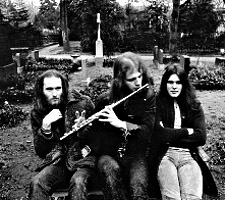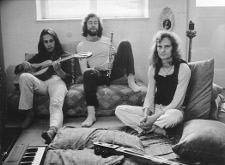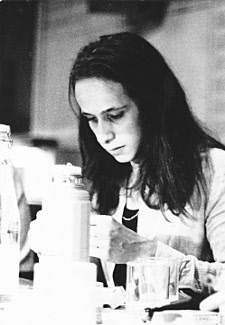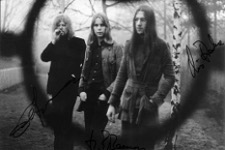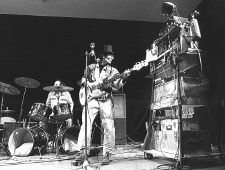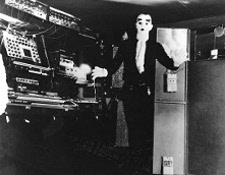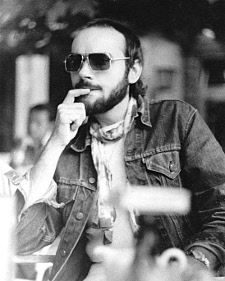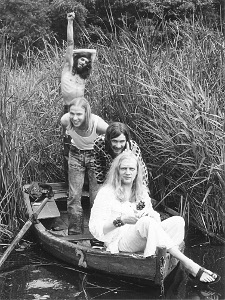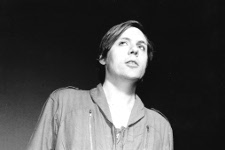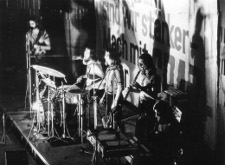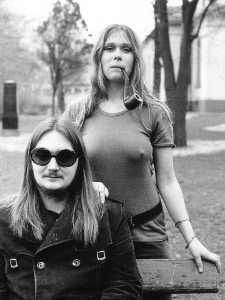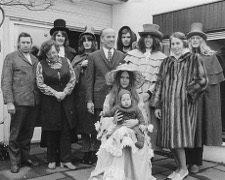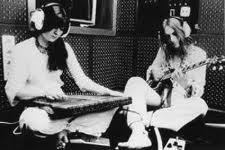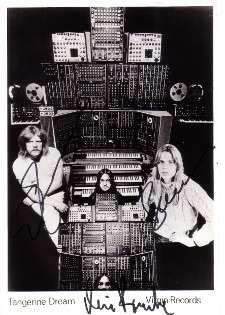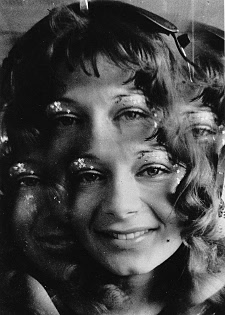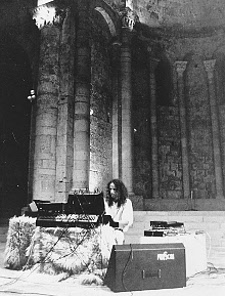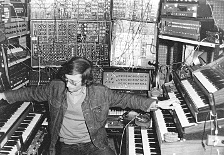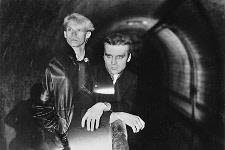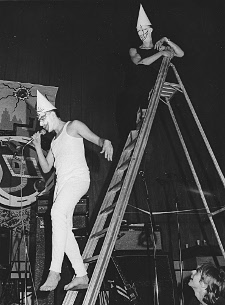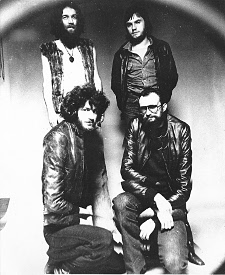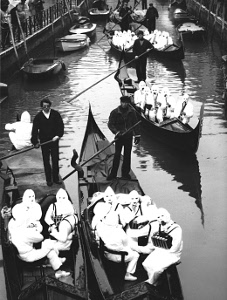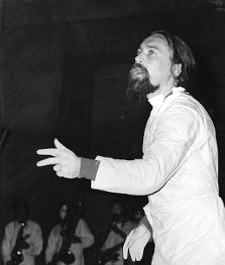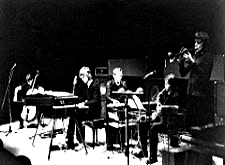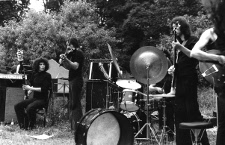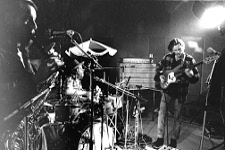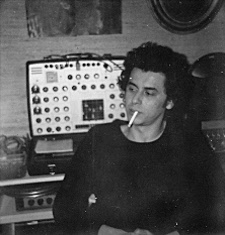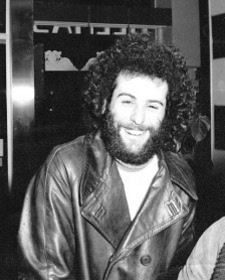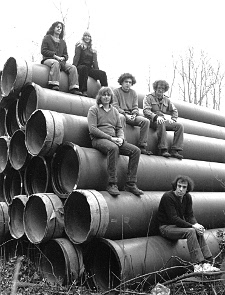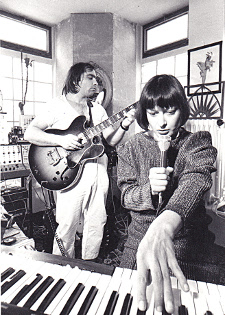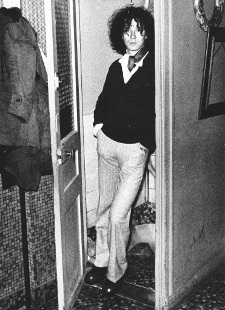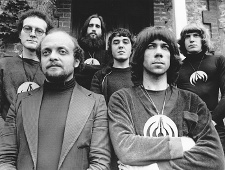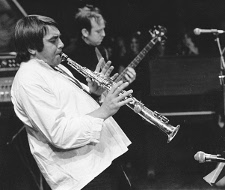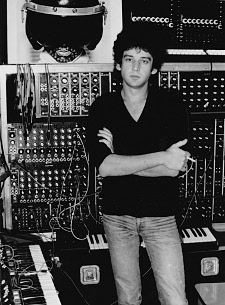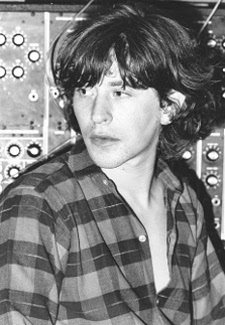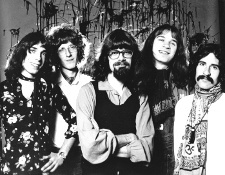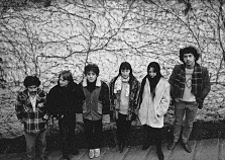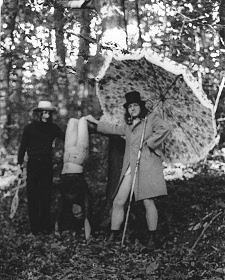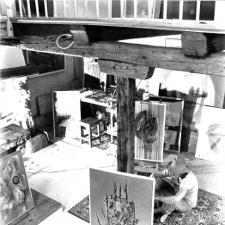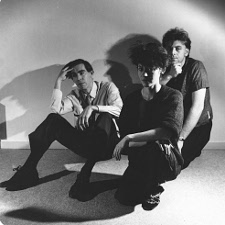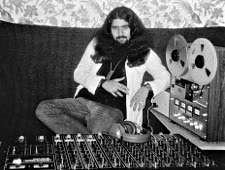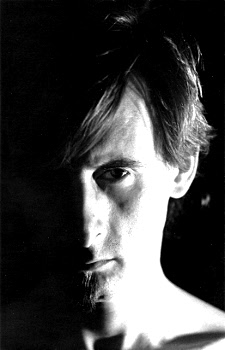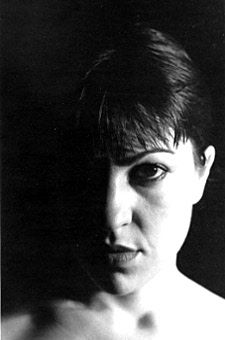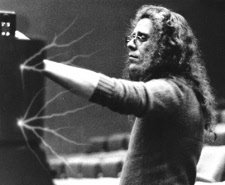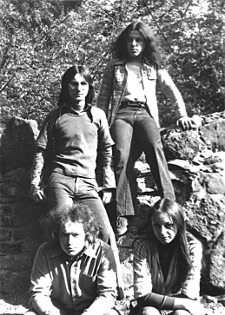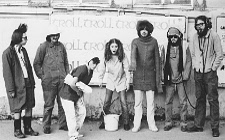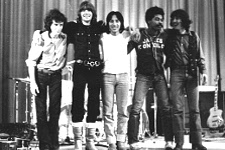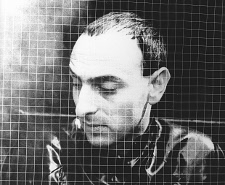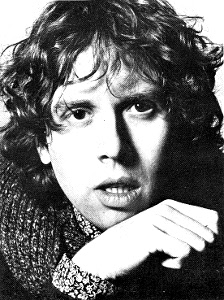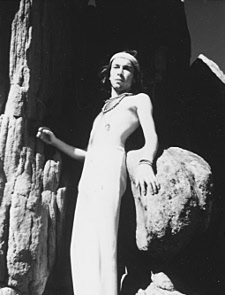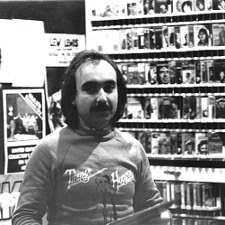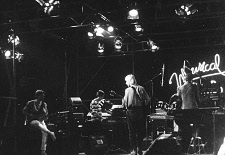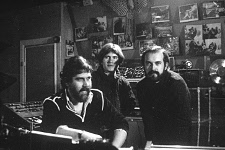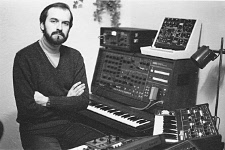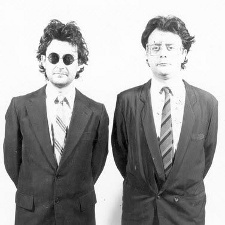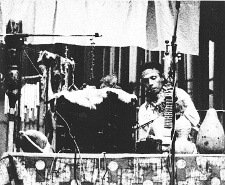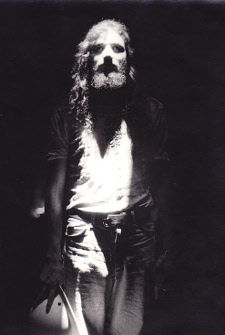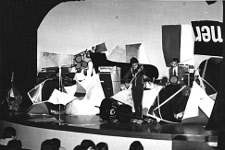The Story so far...
1970's- FM radio, Alternative Magazine & 1st US Indie Distributor of Euro Rock
1980's- D.I.Y. LP + Cassette & CD label
1990's- Distribution via the WWW
2010- Eurock.com ~ Multimedia Podcasting, Interviews & Reviews.
Label & Artist Submissions Accepted for Review...
Klassik Krautrock
Artistes Français
|
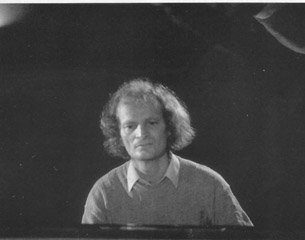
Florian Fricke Interview 1989
by Ian Laycock
There are musicians and musicians. Many go in for flash displays and pyrotechnics. Others - much harder to find - are more concerned to bring about some very specific effects through their music; after all, in the major ancient civilizations music was used as a powerful means of bringing about personal change. Of the latter type of musician, the one who springs most readily to my mind is Florian Fricke, who has put out a steady flow of releases with colleagues in Germany under the name of Popol Vuh.
Since 1969 there has been a succession of striking recordings, all in a very powerful and uplifting vein. Florian has also provided the music to many of Werner Herzog's films, which have a very definite cult following throughout Europe. In Aguirre, Wrath of God and Fitzcarraldo there are wonderful scenes shot in South America, which are accompanied by music perfectly matched to the majesty of the image. Nosferatu has some stunning work which obviously got through to other musicians (more on this later!) whilst Cobra Verde from 1987 retains the visual theme of things South American and also African with haunting melodies and undercurrents written by Florian and played by Popol Vuh. Herzog comments: "For me Popol Vuh is a stroke of good luck. Florian Fricke's music always unveils something hidden in the images, something lost in the darkness of our very soul".
Born in 1944, Florian Fricke studied music in Freiburg im Breisgau near the Franco-German border. Since 1971 there have been numerous LPs with Popol Vuh and there are now some exceptional compilations appearing on compact disc via the devious routes of Norway, France and the USA.
A craftsman and also a man of great insight into the workings of sound and music, Florian rarely goes in for interviews; the last one in the UK (in English) before this was around 1981!
We sat in his house in Munich and drank tea and spoke of many things. The first question was about this working relationship with Herzog. How had it all started?
Werner Herzog had finished filming Aguirre and was in Rome doing the English sync for the film. He was desperately looking for suitable music. He tried with Morricone but couldn't find anything suitable for the film and was very unhappy about it. He was living in an albergo in Rome and was eating there one evening with a young actress from Germany. The conversation finally got round to this problem, that he couldn't get the right music and she said, "There's only one person, really, and that's Florian". So he rang me in Munich, I went to Rome and he showed me the film. I went home and wrote the music and from that point on I was the composer on Werner Herzog's films.
Was he living in Munich at the time?
Yes! But most certainly would never have thought of using the music!
Popol Vuh itself is quite a fluid structure. There have been many musicians involved. Is it a group, a vehicle for ideas, or what?
When I began to make records in 1969 it was usual for one to give the whole undertaking a name which would convey something to the listener which would cause an association with the music, perhaps the spirit of what was behind it. There were three of us and I gave the name Popol Vuh to that whole.
Why?
That's quite difficult to say, but at the time I found an old 1910 translation of the book of the Quiche Maya Indians which isn't identical to the version that's around nowadays, it's quite different. The spiritual background of the book is comparable with the bible with us, the story of the origins of the world and all that and for me that was very meaningful because all the other books I'd read I could understand anew. The book Popol Vuh meant a great deal to me and I suddenly had the idea to call it that.
So one knows that something a bit different is coming up, on seeing that name?
A certain spirituality.
Which is to say that you are obviously interested in spirituality?
I wouldn't say "interested", but rather that I think and feel in a spiritual way.
In a specific way or....?
No, not even that. On the contrary. The first records were trying to display a common kernel to different religions in their content. I was even trying to show that there is no real difference in content between the Popol Vuh and the bible or in the creation stories of the Indians or the Buddhists. All religions have something held in common at their heart.
So you're trying to go in this direction with the music. Is it right to say that, or....?
Well I would say "to express the Inner Man in music". Simply stated, "Music in which the soul vibrates (schwingt)".
Do you have definite philosophies for the music? Are you trying to bring about a specific effect in us, and if so, how do you approach it?
Yes, I would like it to be that when someone listens to the music they are elevated by it and enter into that Inner Man, not the "I" of the everyday, but rather that "I" which now and then is ushered in, and have the music speak to that.
Do you improvise much now, or is it all planned out and constructed?
Well, I've been making published music for twenty years now and there have been different stages. There was a period where it came out of improvisation and then there was the phase where I composed music from the instrument. Nowadays, when I make a lot of film music, which can't really come from my instrument, which is the piano, I sing from my heart. It starts off really small and a song develops from it. It doesn't matter where I am, whether I'm working in the garden or out for a walk or sitting in an inn; it's all the same to me. I put the song down on the instrument in the final style.
Are you still putting albums out as albums or are you only making film music now?
I do film music specifically for Werner Herzog but also for others if it's right. If the film has the same kind of motivation (as Herzog's have) that is there when I'm making music so that you can see pictures afresh, then the two come together. If I make an album then I have something that I want to say, an idea that I want to put across, without finding that in a title, yet it is a kind of answer to the time in which we are living, or at least how I experience the time. I believe that music can provide a great contribution to what is happening in our time. Just as there is a contribution, though unseen, if say 6000 people around the world meditate and create a climate to which people in other fields are susceptible, say in politics or civil rights movements or Greenpeace or peace movements, so this climate can also be enhanced and strengthened by music. If I think something beautiful then it's never lost, never. Someone else - they might be in Buenos Aries or East Berlin, it doesn't matter - who is on a similar vibration will pick that up. That is the greatest responsibility then that one has, when speaking, when thinking, when singing, or when playing a note.
I agree entirely! I believe that music is for elevating people, and that's why I think your music will last, because that's what it does. And I can only see that influence permeating through to people who come after us.
Yes! It's a music which is never really destined for an enormous public, but in a strange way, the older it gets, the more it appears to be sold. I'm not the only one to be doing things in this area! But look at what Sting and McCartney are doing in terms of the environment. These are important influences. I prefer to put content and vibration into sound and the structure of music. For me it's a Tantric process, a definite science, and you have to see very clearly what you are doing.
You are still actively involved in music, then?
I do the albums and film music and occasional concerts from time to time....
I didn't know you played live!
Occasionally!
Where, then?
The last one was two years ago in Munich for a benefit concert for Ladakh, for a development fund to try to alter some of the bad effects of previous aid. Against all the concrete and such like being introduced. On the other side of that, it's difficult to get out that same sound that we can really watch over in the studio. So I'm really no fanatic for playing live!
Was it solo?
Daniel Fichelscher (ex Amon D��l II) on guitar - he has such a big heart that man! - and we worked with an assortment of female singers, but I suppose that you would say that the core is Daniel and myself. When I've composed the things, then he's the next one that I play them with. I love working with him - a spiritual man!
You spoke of singers. I wanted to ask who it was who sang on Hosianna Mantra because she has such a pure voice. On the sleeve in England there were no credits at all.
She is a young Korean, Djong Yun, and she's the daughter of the modern classical composer Isang Yung who's Professor at the Berlin Music School and wrote the Opera for the Munich Olympics. She has an angelic voice, really. She then went to New York because her daughter had an extraordinary gift for the violin. After her, Renate Knaup (also from Amon D��l II) came over to us. She had been with us in the studio before and had listened and joined in. There was always a sort of exchange between the members of the bands in Munich; it was never quite as clear-cut as "Here are the Beatles and over here the Stones, and ne'er the twain shall meet". When you've been making music for 20 years then your style obviously changes. New musicians come along; some go. But the kernel is and remains the guitarist Daniel Fichelscher and myself.
In the beginning, on the first album Affenstunde and the second especially, In den Garten Pharaos; there was a great deal of promotion here in Germany. I traveled around from one radio station to another and realized that there was so much nonsense being spoken. Then the third album, Hosianna Mantra, came out and the record company had the cheek to put out the album (without asking me) with the description "7 Holy Songs from Popol Vuh". At that point I said "No more!� And I've never done any promotion since! I don't think it's necessary. With Herzog's film music I have enough external promotion. It's enough, and I really have no inclination to do it any more.
Do you know Kate Bush?
Yes, well, she rang up and wanted to adapt and record a song from Nosferatu. At that time I didn't know who Kate Bush was, so I said no! Today I know, of course, and would have helped in some way. She's good!
There is a dedication to you on her "The Hounds of Love" album.
Really? I have to say that I've been a purist for many years and it's only now when my son is old enough to be up-to-date with all the latest things that I know who Kate Bush is or Tracy Chapman. Before I was uninformed about any of those areas. I wouldn't listen to anything for the reason that a composer is very easily influenced, without noticing it. Without noticing he copies and I didn't want to do that.
So what are your influences?
I've traveled frequently around the world. I've been to Afghanistan, the Himalayas, India, Africa and this natural, human, non manipulated music forces its way into your being. Also early Greek music.
Have you studied those types of music, such as Greek music?
No, only heard them, just for myself, for pleasure. But I listen to very little.
Can we talk about methods of working? You studied at the Music College in Freiburg im Breisgau. Was that only piano?
It was piano and everything else that one needed, counterpoint and so on, but I didn't learn composition there. I was never able to find a connection with modern classical music except that music is for me the image of the cosmic, just like a Pythagorean, and the deep experience of what a fifth is or what a third is, what an interval is, that was far more important to me than all my learning in the music college. The mathematical metaphysics of music opened itself up in me at some point and from that point on I could compose.
As for methods of working, before, as we said, there was originally improvisation, then what I would call composition, this mixture of idea, improvisation, construction, then forgetting all that again, and no longer composing from an instrument, but composing from song. I've got no piano here. I sing it.
With a tape-recorder there or....?
No, with musicians there, or I stand in the studio and sing with a guitarist there or a keyboard player. Well, I have a piano, but it's in the country where I take myself off from time to time and then I play sometimes.
So there's nothing written down?
Oh yes, I have to do that as well! Particularly if I'm writing for choirs or for oboists or for people who can only play when they're reading notes. It's just that I like that the least because there's no real heart in it. When you sing a phrase as a composer then the musician can hear how you want the music. And he can get it on his instrument, in the way that he phrases it. If I note down in that way then I am not certain of what I may get. For example the big choirs in Fitzcarraldo. For me that was also a great pain, in part. Although I conducted it myself, it was hard to alter certain habits. When I come together with musicians to play, then I know that we are in tune with one another in terms of vibration and outlook. That's why I don't think my music is reproducible by others.
In the studio my methods of working are quite varied. I most often play just with guitar and piano and then synchronize further from there, for multi-tracking.
Do you use SMPTE and computers?
I haven't done for my own work, but when I'm producing for others, then yes.
You're producing for another group at the moment?
Yes an American group. Almost exclusively with a computer. I'm fascinated by this work but I'll never adapt it for my own work. It's the possibilities which are there which I find fascinating.
Do you ever do anything in just one take?
Yes. There are very different recordings, for example one of just piano alone, which was only released in America, and called Spirit of Peace which has an entire side of me alone on piano. Then there are some very beautiful recordings of just guitar and piano. But in the work with Herzog it became very obvious that the piano is a very bourgeois instrument, and you can't really accompany Indians pulling boats over a mountain with it. That was just impossible, so there's no piano part on that! So I was forced into this great archaic sound, choirs and kettle-drums and that type of thing. Nonetheless I've just about always managed to express with others what I've expressed on the piano. When I spoke of the choir before, about all those customs and traditions that I detest like the plague, I went after that with the tape and did something which would be doubted by any producer, namely, made the sound worse. And that way I would say that it's better.
You don't have your own studio and so you use various studios?
I never wanted to load myself down with technology. It's just an ideal with me to be able to do my work just as a person, without anything else. I always looked with pity on Pink Floyd if they could only play music when they were out with 4 or 5 trucks full of equipment. Perhaps that's the reason why I do my composing from singing now and not from the piano. I can't take a piano out under the trees; it might be easier with flute or guitar, but I'd still have to take those with me as well! I wanted to say earlier I don't just make records, film music and the occasional concert, I travel once a month somewhere in Germany and sing with people. I've been doing that for 8 years now, in a choir. You could label it as "Body-space Music" (K�rperraummusik) where you sing inside the body and take it in such a way that every cell in the body from the sole of the foot to the crown of the head starts to vibrate. In order to be able to realize this I have experimented to find where speech resonates in the body. The consonants vibrate at the body walls, the bones and the flesh and the vowels fill the body spaces. And that sounds like a gong-concert: it also has a great therapeutic effect. This singing with other people is for me just as important as making records which might be heard in San Francisco. So each month I do that, in Cologne or Aachen or Stuttgart or wherever.
Always with the same people or does it change from town to town?
It varies. Most recently I sang with over 50 people in Frankfurt at a Gestalt Therapy Congress. There is also a recording of this type of performance. It's called Die Erde und ich sind eins (The Earth and I are One).
Is it available?
Yes, but it's quite difficult to get hold of. It wasn't put out for the music business, but for therapeutics. The background to it is that I experienced early on that the original sense of music is not for going crazy, but that it has an enormous effect on the psyche and the physical aspect of Humanity. And originally it was only used in this way thousands of years ago. And in the bourgeois development of the Romantics suddenly we are shown that the melancholy of Brahms is important or the morbid side of Chopin. And I'm absolutely not interested in any of that. Egotism through music doesn't interest me, but rather the unbelievable active changing power of music. To go from speech to responsibility.
But it holds its own, this work that I'm doing "near" to composition, with music such as Hosianna Mantra or Spirit of Peace.
Have you worked with other mantras?
Occasionally. But never so that it could be heard outside! I have to say that a great deal in this whole New Age movement is just not serious at all. If I am a co-founder of this development then I would want nothing to do with it! People do it all so easily! They sell sounds and claim that they can open certain chakras as if they were a treasure store and they were selling the keys. This is a great misunderstanding, a great folly. I try to speak to the soul in the Man, and what the individual does with this then is his affair. He remains free. He can go and build a beautiful tree house or something. Or understand suddenly that he would like to plant some flowers in his garden.
Where do you have this knowledge from?
It comes from inside. And never from casual situations. It never comes by chance. And you can't really learn it. It comes when the individual finds his or her own way to what's inside. If I accept something, if I am a follower of Ouspensky then I can't really express it because I haven't found my own way to myself. It has a great deal to do with Love, does Tone, Sound.
And yet it's mainly misused.
Yes, if the vanity of people is used.
What are you working on currently?
Well, I'm working with a Broadway singer on a disco production!!! But it's very, very positive. Underneath, disco, but on top, "Good morning sunshine!" music. And it's also political work; we're hoping to have them dancing to it in the discos. I think we can't forget that the large part of today's pop music works against it. I don't want to start moralizing but anything other than rejoicing for Humanity is tied up with brutality and harshness in people. If you analyze the backing, the basic sounds, drum and bass, of today's music, it's all very hard.
But you generally haven't used drums, or at least, very rarely.
In Popol Vuh music, never, or at least, only well down in the production. But never as hard as all that. But in disco music you need to have this presence. But above that, something very positive.
Is it already finished?
Almost. We're just doing the final lyrics and next week we're mixing. His music is very much "World Family". Players from Argentina, Iraq, New York.
That's an area that Peter Gabriel is involved in. Are you familiar with his work?
Yes he did the soundtrack for Scorsese, for The Last Temptation of Christ. If anybody had asked me which other films I would have liked to work on then I would have had to say "Last Temptation". And then there was Peter Gabriel!
But you obviously like working on film music!
Oh yes! If the film is good, then it's wonderful work. Now, as well, you have the video in the studio and you can play along with each movement. Very interesting, and very different from what it used to be.
It's a very precise type of work.
Yes, every camera movement, every catch of breath you have to be with. But I like doing it, love working with Werner Herzog. He's a fascinating worker. I'm working at the moment on an Italian film (not one of Herzog's, although he premiered the scenario at an international competition). I'm very happy to be doing it. Early next year I shall be taking a break from film music and will be doing my own music. This disco production happened because a young pianist from Munich came to see me and played for me and I heard that he had exceptional qualities. Then the singer came from New York and we got it all down.
So, is that the next project, or....?
We're just doing that at the moment. The next Popol Vuh album will be in the new year. It's almost finished.
Does it have a name yet?
Not yet. But an idea. Something like "Hab Mut bis dir die Sonne wieder scheint" (Have courage until the sun shines for you again). Remember that music should be an example. If I express my doubts and depressions that's not right. If you think that people put on a record in their home in the morning then it's good that it should be something beautiful for them to listen to.
Do you know how many records you've made?
No, I haven't been counting. There have been some compilations. There's been a lot lying around in the cellars of the big companies who don't exist any more, like United Artists, Metronome, but they're just about all to come out on CD.
I wondered if you could identify them all, as it's quite difficult to know what's what. The situation was somewhat complicated by a Norwegian group having the same name. They produced two albums, Popol Vuh and Quiche Maya, before changing their name to Popol Ace. All their work (including 3 albums as Popol Ace) was on Polydor.
Let�s see:
Affenstunde
In den Garten Pharaos
Hosianna Mantra
Aguirre
Seligpreisung
Einsjager, Sibenjager
Hohelied Salomos
What about Die grosse Ekstase des Bildschnitzers Steiner, Herzog film from 1974?
No, unfortunately that wasn't ever released. Werner Herzog has got that. There was some good music in that film.
So, back to the list:
Letzte Tage, Letzte Nachte
Sei still, wisse, ICH BIN
Agape, Agape
Spirit of Peace
Tantric Songs
Herz aus Glas
Nosferatu
Fitzcarraldo
Cobra Verde
and several compilations.
There was also a Christmas single with an orchestra, which is now forgotten, after Hosianna Mantra.
Then certain record companies put together records for which I am not responsible, for example Yoga, in Italy. It's not easy to spend 20 years and more working in this branch of music. You have to select a very definite route in order to make a lifetime of music. A lot of people have tried to reproduce successful records and have folded because of it.
For me, composition is top, then recording and everything else comes after that.
Do you intend working again with Herzog?
Oh yes! Next year again. In between films he's been producing operas, in Italy and at Bayreuth. He's living in Vienna now, not Munich. He also spends a lot of time in Bologna. He's very busy these days. We only meet privately when it's a question of film music. He rings up when something big happens in his life. It's great working with him.
At this point we had to get moving, Florian to the studios, me to the airport.
(Thanks to Florian and Bettina Fricke for their hospitality, Popol Vuh for the music and Carl Suittland and Jan Erik S�lo in Norway for details on Popol Ace)
Copyright �1989, Ian Laycock (All Rights Reserved)
Reprinted 2005, Eurock by Permission
 reviews features podcasts email bio
reviews features podcasts email bio